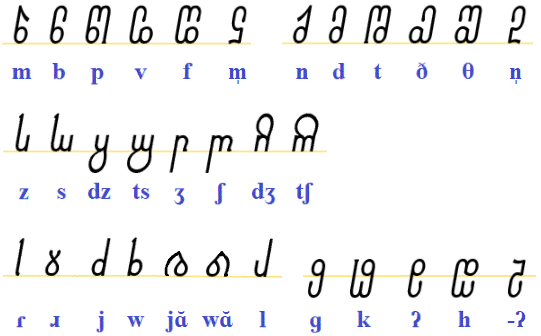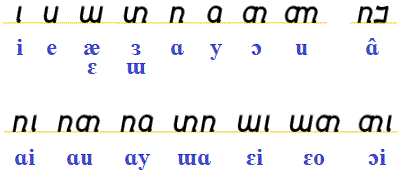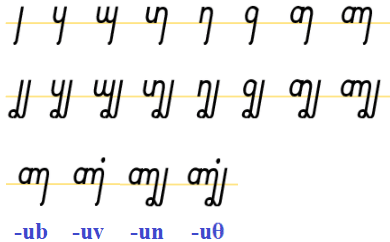
θɔi
θɔi
This script is a revision of my script Pranish, modified slightly to accomodate its target language Sgai, which was itself thoroughly revised in 2020–2021. It is a Phonological Cypher, being an easily written, phonetically consistent alphabet like others in that series. In the Sgai language, the name means “moon”, a rough translation of the proto-Sgai word pranish.
Consonants
All consonants are either taller than the x-height, or descend below the baseline. Some are used morphemically: vocalic [m,n], short [ja,wa] and glottal coda have glyphs to distinguish them; affricates are only used in morphemes.
Vowels
This is the simple, final (open-syllable) form of vowels. They have no ascender or descender, rising only to the x-height. A circular shape is attached at the left to form a rounded vowel. The vowel set of Sgai includes seven diphthongs. Falling tone is indicated by a three-sided box.
If the vowel is followed (closed) by a consonant, one of [ b v n θ ], then the right side is extended down to form a tail. The simple tail is for bilabial finals, the curled & rising tail is for dental finals, and a dot above indicates the fricative. Only rootwords have closed syllables.
Note that some consonants used morphemically [ b d f ɡ h l m s ʃ ] have no vowels written, but a short voiced or unvoiced schwa is assumed to emerge. Unvoiced consonants with their unvoiced schwa can sound like they are forming clusters.
Other symbols
The following groups of glyphs are used morphemically in Sgai. The first are verb suffixes referring to the actors, and two may be combined into a new form. The traditional, softer pronunciation uses ejectives, while louder speech may use the plosive variation.
Prefixed [s] forms a plural, and [səs] is a doubled form for various purposes. Suffixed aspirated plosives [t,k] are used to mark the active and passive participants, and aspirated plosive [p] is used to mark adverbs.
Example
A translation into Sgai from Shakespeare’s Sonnet XVIII.
Zhevm'fayth tsh bwatheonshk syq'paewa\
Raiv tsh loejook saovaiba7 zha\
Sbeovsheivt sdethlibm'kentok movt'
Tsh roibroem'faytht zhathzhaethjok rovt'
Shall I compare thee to a summer’s day?
Thou art more lovely and more temperate;
Rough winds do shake the darling buds of May,
And summer’s lease hath all too short a date.





